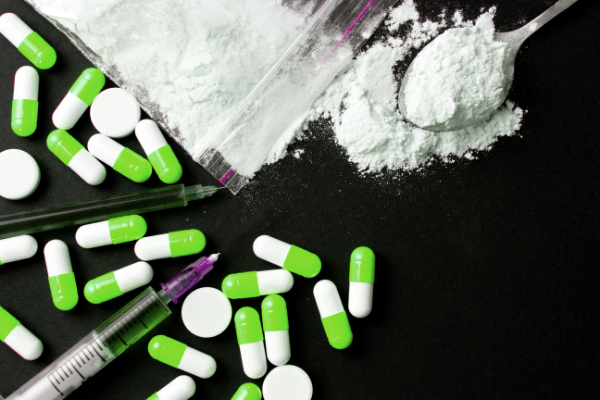Whenever a person abuses more than one substance at a time, we refer to multi-substance abuse, also called poly-substance abuse. The term does not refer to drinking alcohol and then later snorting cocaine to wake up (as an example), but rather, mixing various drugs simultaneously. Usually, this is done to achieve a more potent high. Multiple drug abusers want to achieve the sensation they are looking for and find that it can be combined with many drugs. However, the risk of accidental overdose or neural damages goes way up, and they usually end up amplifying any adverse effects that each drug often causes. This occurs because of the body’s mechanism to ensure life.
What Are Common Poly-Substance Mixtures?
Some of the most common poly-drug mixtures are known as speedballs. The traditional speedball is, of course, heroin and cocaine. Today though, many drug addicts combine methamphetamine and Fentanyl, or Oxycontin and Adderall, or other combos of sedatives and stimulants. Different poly-drug combinations include benzodiazepines and prescription pain killers, ecstasy and benzodiazepines, and alcohol is almost always mixed with nearly all addictive drugs to minimize nervousness or potentiate the effects of an opioid pain killer. The most sought-after poly-substance is a mixture of three different prescription medications called the Holy Trinity.
What is the Holy Trinity?
The Holy Trinity is a combination of a benzodiazepine (Xanax, valium, Ativan, Klonopin), a prescription opioid (Vicodin, Dilaudid, Norco, Percocet, Oxycontin, etc.), and a muscle relaxer (Soma, Flexeril, Robaxin, etc.). Pharmacies have flagged these prescription medications to alert police when all three are prescribed together and with frequency. Most but not all medical doctors are aware of the Holy Trinity. As a result, some addicts will see multiple doctors score one prescription of each separately to be then able to ingest the Holy Trinity. The effects of this poly-drug cocktail decrease the activity of the central nervous system by each medication, which is very dangerous and often leads to death or accidental overdose.
Why the DEA Warns Against the Holy Trinity
Since the Holy Trinity is a lethal combination, the Drug Enforcement Agency states what is in a Holy Trinity and how there is no medical need to prescribe all three.
Overprescribing controlled substances, especially prescribing the “Holy Trinity” of prescription drugs, is dangerous, and there is no acceptable medical reason to do so. The “Holy Trinity” is a colloquial term to describe the prescription of a combination of drugs comprised of a benzodiazepine, an opioid, and a muscle relaxant, which, while highly sought out on the street, is especially dangerous because each of those medications depresses the central nervous system and the ability to breathe. (DEA)
Why Do People Use Multiple Drugs At the Same Time?
People will abuse many substances at once to achieve a more profound high. In general, the poly-substance addict usually has a drug of choice that they will combine with other drugs to enhance the impact of the primary drug. For example, when individuals abuse opioids, such as painkillers or heroin, they will often mix them with benzodiazepines to achieve more relaxation or a sedative effect. Or a methamphetamine addict will use benzodiazepines to ward off paranoia and alcohol to level off.
What Medical Conditions Occur From Poly-Substance Abuse?
The dangers of mixing many drugs and alcohol at once can cause death. The other medical problems that happen when a person does this often includes:
- Decreased Motor Function
- Memory Lapses
- Poor Coordination
- Multi-drug Withdrawal Symptoms
- Visceral Organ Bleeding
- Headaches
- Shaking and Cramping Hands, legs, arms
- Seizures
- Heart Attacks
- Brain Aneurysm
What Treatment Is Best For Poly-Substance Abuse?
The first phase of treatment for a poly-drug user is medically supervised detoxification which is necessary as the individual will experience varying withdrawal symptoms depending on the types of drugs they were taking. Next must be a comprehensive addiction treatment program focusing on therapy. Poly-substance addicts are often the most chronic addicts and need in-depth therapy to help them overcome their need to use many drugs. Cognitive-behavioral therapy or dialectical behavioral therapy is most often used to treat poly-substance abuse. A central aspect of these behavioral therapy types is identifying thought patterns and emotional responses, which helps control negative thoughts and change behavior.
Call For Same Day Admission to Evoke Wellness Poly-Substance Abuse Treatment in Massachusetts
We at Evoke Wellness at Cohasset provide personalized treatment plans and evidence-based therapy for poly-drug addictions. Do not let the disease of drug addiction kill you. We have helped thousands let go of the need to use drugs to feel happy. Recovery works with professional support! Call now!




